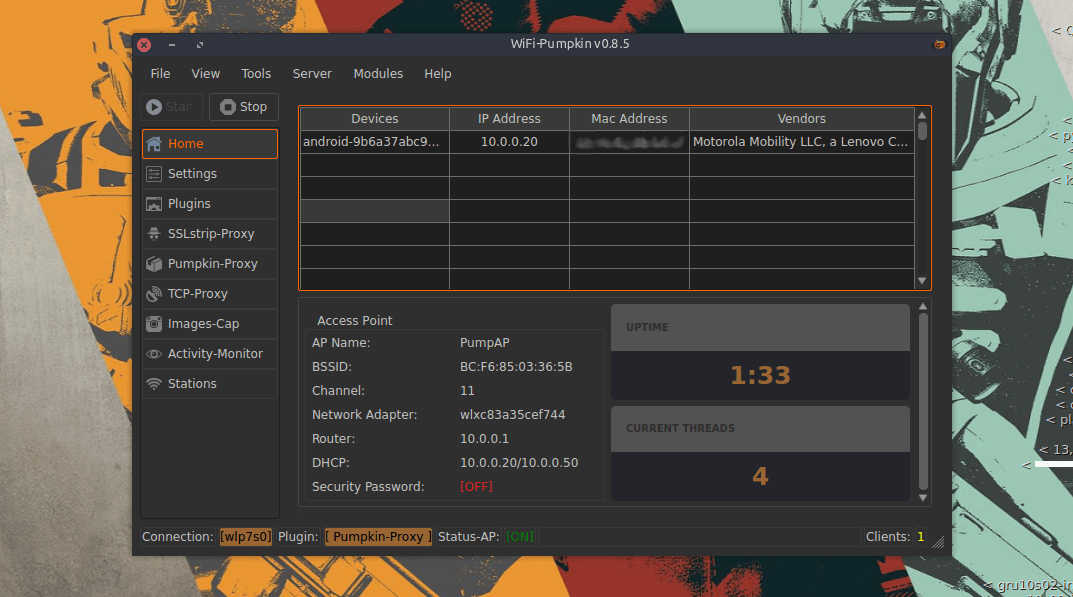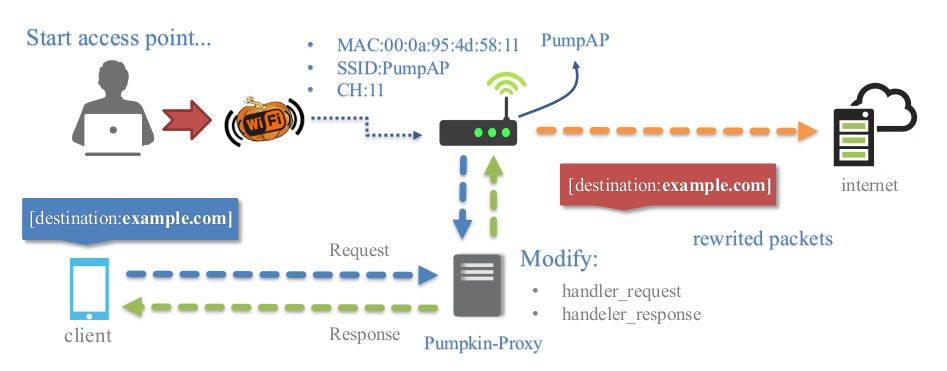WiFi-Pumpkin is an extremely total system for evaluating Wi-Fi security. The fundamental feature is the capacity to make a phony AP and make Man In The Middle attack, however the rundown of highlights is very expansive.

Also Read Androl4b – Android Security Virtual Machine
Installation WiFi-Pumpkin
- Python 2.7
git clone https://github.com/P0cL4bs/WiFi-Pumpkin.git
cd WiFi-Pumpkin
./installer.sh --install
or download .deb file to install
sudo dpkg -i wifi-pumpkin-0.8.5-all.deb
sudo apt-get -f install # force install dependencies if not install normally
Features WiFi-Pumpkin
- Rogue Wi-Fi Access Point
- Deauth Attack Clients AP
- Probe Request Monitor
- DHCP Starvation Attack
- Credentials Monitor
- Transparent Proxy
- Windows Update Attack
- Phishing Manager
- Partial Bypass HSTS protocol
- Support beef hook
- ARP Poison
- DNS Spoof
- Patch Binaries via MITM
- Karma Attacks (support hostapd-mana)
- LLMNR, NBT-NS and MDNS poisoner (Responder)
- Pumpkin-Proxy (ProxyServer (mitmproxy API))
- Capture images on the fly
- TCP-Proxy (with scapy)
Plugins
| Plugin | Description |
|---|---|
| Dns2proxy | This tools offer a different features for post-explotation once you change the DNS server to a Victim. |
| Sstrip2 | Sslstrip is a MITM tool that implements Moxie Marlinspike’s SSL stripping attacks based version fork @LeonardoNve/@xtr4nge. |
| Sergio_proxy | Sergio Proxy (a Super Effective Recorder of Gathered Inputs and Outputs) is an HTTP proxy that was written in Python for the Twisted framework. |
| BDFProxy | Patch Binaries via MITM: BackdoorFactory + mitmProxy, bdfproxy-ng is a fork and review of the original BDFProxy @secretsquirrel. |
| Responder | Responder an LLMNR, NBT-NS and MDNS poisoner. Author: Laurent Gaffie |
Transparent Proxy

Transparent proxies(mitmproxy) that you can use to block and control HTTP traffic altering solicitations and responses, that permit to infuse javascripts into the objectives went by. You can without much of a stretch actualize a module to infuse information into pages making a python document in catalog “modules/expansion/” naturally will be recorded on Pumpkin-Proxy tab.
Plugins Example Dev
from mitmproxy.models import decoded # for decode content html
from plugins.extension.plugin import PluginTemplate
class Nameplugin(PluginTemplate):
meta = {
'Name' : 'Nameplugin',
'Version' : '1.0',
'Description' : 'Brief description of the new plugin',
'Author' : 'by dev'
}
def __init__(self):
for key,value in self.meta.items():
self.__dict__[key] = value
# if you want set arguments check refer wiki more info.
self.ConfigParser = False # No require arguments
def request(self, flow):
print flow.__dict__
print flow.request.__dict__
print flow.request.headers.__dict__ # request headers
host = flow.request.pretty_host # get domain on the fly requests
versionH = flow.request.http_version # get http version
# get redirect domains example
# pretty_host takes the "Host" header of the request into account,
if flow.request.pretty_host == "example.org":
flow.request.host = "mitmproxy.org"
# get all request Header example
self.send_output.emit("\n[{}][HTTP REQUEST HEADERS]".format(self.Name))
for name, valur in flow.request.headers.iteritems():
self.send_output.emit('{}: {}'.format(name,valur))
print flow.request.method # show method request
# the model printer data
self.send_output.emit('[NamePlugin]:: this is model for save data logging')
def response(self, flow):
print flow.__dict__
print flow.response.__dict__
print flow.response.headers.__dict__ #convert headers for python dict
print flow.response.headers['Content-Type'] # get content type
#every HTTP response before it is returned to the client
with decoded(flow.response):
print flow.response.content # content html
flow.response.content.replace('</body>','<h1>injected</h1></body>') # replace content tag
del flow.response.headers["X-XSS-Protection"] # remove protection Header
flow.response.headers["newheader"] = "foo" # adds a new header
#and the new header will be added to all responses passing through the proxy
TCP-Proxy Server
An proxy that you can put between in a TCP stream. It channels the demand and reaction streams with (scapy module) and effectively adjust parcels of a TCP convention that gets blocked by WiFi-Pumpkin. this module utilizes modules to see or adjust the blocked information that potentially least demanding execution of a module, simply include your custom module “modules/analyzers/” consequently will be recorded on TCP-Proxy tab.
from scapy.all import * from scapy_http import http # for layer HTTP from default import PSniffer # base plugin class class ExamplePlugin(PSniffer): _activated = False _instance = None meta = { 'Name' : 'Example', 'Version' : '1.0', 'Description' : 'Brief description of the new plugin', 'Author' : 'your name', } def __init__(self): for key,value in self.meta.items(): self.__dict__[key] = value @staticmethod def getInstance(): if ExamplePlugin._instance is None: ExamplePlugin._instance = ExamplePlugin() return ExamplePlugin._instance def filterPackets(self,pkt): # (pkt) object in order to modify the data on the fly if pkt.haslayer(http.HTTPRequest): # filter only http request http_layer = pkt.getlayer(http.HTTPRequest) # get http fields as dict type ip_layer = pkt.getlayer(IP)# get ip headers fields as dict type print http_layer.fields['Method'] # show method http request # show all item in Header request http for item in http_layer.fields['Headers']: print('{} : {}'.format(item,http_layer.fields['Headers'][item])) print ip_layer.fields['src'] # show source ip address print ip_layer.fields['dst'] # show destiny ip address print http_layer # show item type dict print ip_layer # show item type dict return self.output.emit({'name_module':'send output to tab TCP-Proxy'})